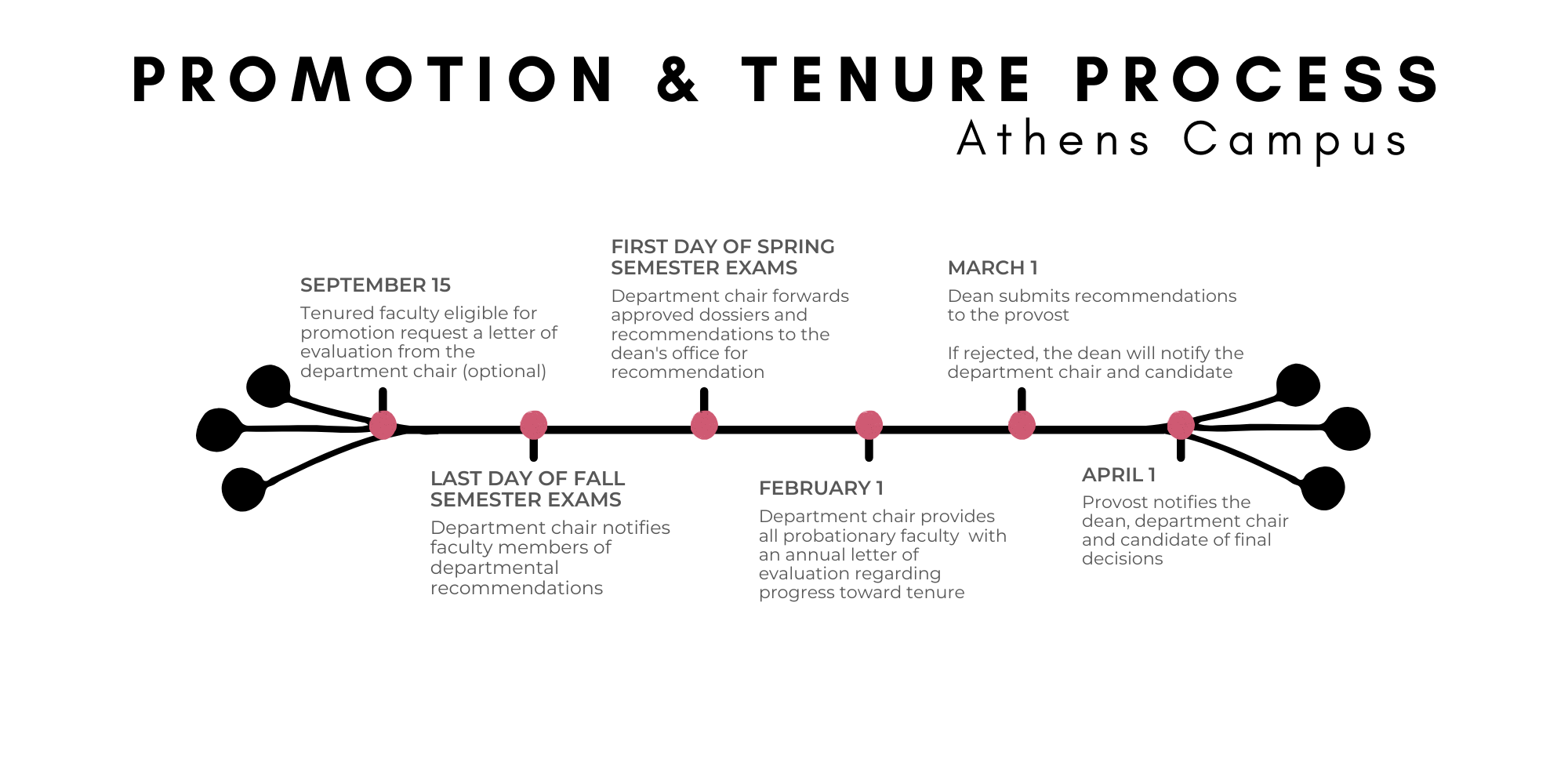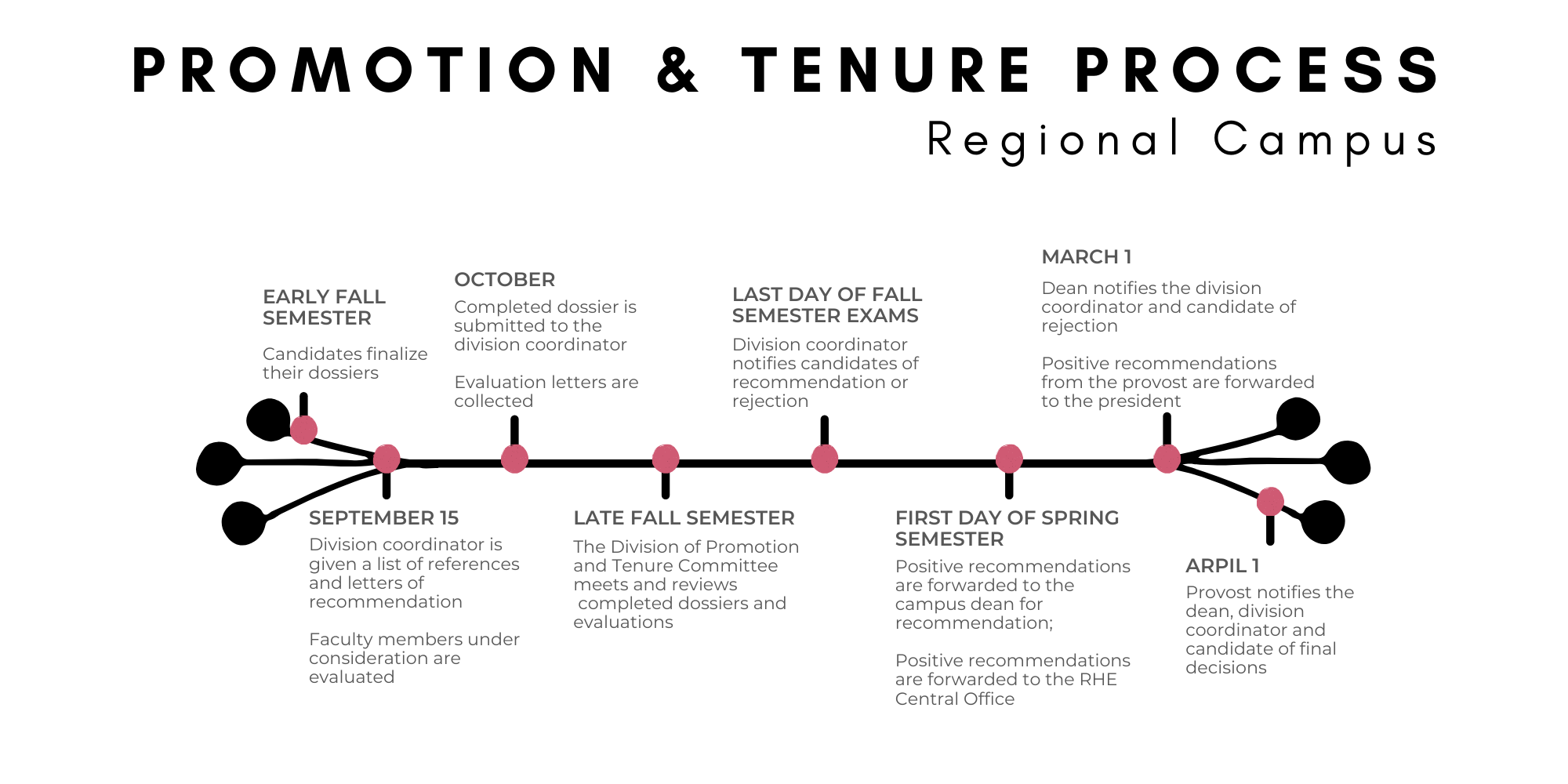A comprehensive guide to understanding the intricate world of tenure policy
Members of the campus community have been trying to get their questions answered about tenure policy following recent discussions surrounding Ohio University professor Yusuf Kalyango’s tenure, only to find themselves confused and overwhelmed.
Kalyango was suspended from teaching in 2018 due to sexual harassment allegations. Most recently, the Ohio U Board of Trustees voted to object to a Faculty Committee report recommending Kalyango keep his tenure and be reinstated as a full professor.
Ultimately, the Board of Trustees will make the final decision on Kalyango’s role at Ohio U. While we wait, let’s decipher the fine print of Ohio U’s tenure policy.
This guide is here to help outline the important details about the school’s guidelines for tenure and answer any questions about the approval — or removal — process.
Promotion and tenure process at Ohio U’s Athens campus timeline. Graphic by Emma Stefanick.
Promotion and tenure process at Ohio U’s regional campuses timeline. Graphic by Emma Stefanick.
What is tenure?
According to the Ohio University Faculty Handbook, tenure is the “freedom of teaching, research and extramural activities, and a sufficient degree of economic security to make the profession attractive to men and women of ability.” It is a permanent position given to faculty who meet specific university and departmental requirements, as well as exhibit exceptional knowledge in their field.
Tenure is not meant to further the interests of the institution or individual educators, but rather to promote the advancement and transmission of knowledge. The Faculty Handbook states that tenure supports academic freedom and the search and dissemination of the truth.
This is done with guidelines that prohibit the dismissal of tenured faculty for their ideas presented in speech, publications or research that might go against the interests of the institution, outside corporations, government or religious groups.
According to the Academic Association of University Professors, when faculty members are limited in the ways they can communicate, they are less apt to address controversial issues and more likely to suppress the results of their work, creating a less conducive environment for student learning, growth and advancement of knowledge. Tenure functions as a safeguard.
Who can get tenure?
Tenure is available only for faculty on the “tenure track” and can be either full or part-time status. The tenure track includes assistant professors, associate professors and full-time professors. It does not consist of any other instructional, clinical or fixed-term staff.
To be considered for tenure, faculty members must have faculty status, which is reserved for those who demonstrate scholarly or professional competence in their academic discipline, and are employed in a teaching or research position for a minimum of two semesters per fiscal year throughout the entire probationary period.
According to the Faculty Handbook, tenure is awarded to faculty whose records show they are “likely to continue to make significant positive contributions to the academic life of the university throughout their professional careers.”
How does someone get tenure?
Promotion and tenure guidelines vary widely by department and school, but there are some standard guidelines that must be met according to university policy in the Faculty Handbook.
Upon hire, tenure track employees will be given a renewable contract for the start of the probationary period with their latest date for tenure review indicated in their letter of appointment.
The purpose of the probationary period is to give the faculty member enough time to establish their academic performance so the university can evaluate them and determine whether or not they should receive tenure.
This probationary period should not exceed seven years; the exceptions are procedural errors, leave for six months or longer or significantly reduced capacity to work for at least six months. It is approved by the Promotion and Tenure Committee of the Faculty Senate.
Faculty on full-time appointments can be hired as assistant professor, associate professor or professor, and part-time appointees can be professor, associate professor, assistant professor, instructor or lecturer according to their experience and qualifications. Faculty can also be promoted to different ranks as they progress through the tenure track.
Tenure is granted by the president once the department chair, dean and provost of the university have written positive recommendations for tenure of the faculty member. Tenure is usually awarded to those who are engaged in activities such as research, scholarly or creative activity, teaching, and service within the department.
Annually, the departmental chair will have a promotion and tenure committee evaluate all probationary and tenured faculty eligible for promotion according to departmental criteria. Then, faculty will be informed each year of their performance evaluation and progress toward fully established tenure by Feb. 1.
While favorable annual reports don’t guarantee tenure, any award of tenure or promotion must originate from a positive recommendation by the departmental committee or after a formal hearing and presidential review which overturns a negative departmental review.
If the evaluation results in active consideration for promotion or tenure in the upcoming year, the faculty member is notified and may submit supplemental materials to aid in the decision. The department chair’s recommendation is then passed along to the college dean for review.
If the dean accepts this positive recommendation, they will submit a written recommendation to the provost accompanied by the documents provided by the department chair. If the department’s recommendation is rejected, the provost will inform the department chair within 30 days and typically before April 1.
If the faculty member will be terminated after the end of their probationary period, notification should be given one year in advance to the end of their probationary period. In the same way, tenure is awarded the year before the end of the probationary period.
Contracts specifying new rank and salary are issued by May 1. This letter of appointment will contain initial workload percentages for teaching, research and service as negotiated for the position and include appropriate promotion and tenure guidelines.
If a part-time faculty member is denied tenure, they are ineligible to continue employment in any faculty classification within the university.
How is tenure removed?
After faculty is given tenure, their position can only be terminated for “adequate clauses except in the case of retirement for age and extraordinary financial exigencies (financial needs),” according to the Faculty Handbook.
Termination can occur through financial exigency, which according to the Faculty Handbook is an “imminent financial crisis that threatens the survival of the institution as a whole and cannot be alleviated by less drastic means” and is determined by the president of the university and the Board of Trustees.
If a person is dismissed due to financial exigency, their position cannot be filled by a replacement within three years unless the dismissed faculty have been offered reappointment and the opportunity to accept or decline it. In all financial exigency cases, faculty are given 12 months terminal notice or severance salary.
Tenured faculty may also be dismissed if their program or department is eliminated for educational reasons, including lack of enrollment and lack of educational quality, which can be defined by quality of instruction, scholarly achievement, academic worth and curricular value.
Before terminating a tenured employee for educational reasons, the administration is supposed to try and place them in another position within the university. Tenure may be regranted to them in the new department. If the program or department that was eliminated is reestablished within three years, the faculty member will be offered reappointment, and in all cases of termination based on elimination, they will be given a 12-month termination notice or severance salary.
Faculty may also be dismissed under the “Loss of Tenure” clause in the Faculty Handbook if their “capability or qualifications are seriously questioned.”
An agreement could be reached with the department chair and may be taken to higher authorities to be settled. The faculty member has the option to hold a hearing with the Faculty Senate, which will determine whether or not there are adequate grounds for removal. If terminated, the faculty member will receive a 12-month terminal contract or severance salary, except in cases where the faculty member displayed “moral turpitude,” an act or behavior which greatly violates community standards and attitudes.
Faculty who are not dismissed for moral turpitude should receive their salaries for at least a year whether or not they continue their work at the institution.
If a faculty member believes there is cause for grievance in relation to non-reappointment or denial for promotion and tenure, an appeal of a negative decision may be initiated at the level the decision was made at. If the appeal is denied at any of these levels, the faculty may take it to the next level of higher authority.
A grievance can involve one or more allegations: inadequate consideration, denial of due process, including failure to follow designated procedures or denial of academic freedom.
Other tenure policies:
Faculty Senate suggests guidelines regarding membership and procedures for every departmental promotion and tenure committees regardless of their differences in tenure and promotion requirements.
Committees should have at least five members with larger numbers for larger departments. Smaller departments should pull members from related disciplines to create diversity on the committee. Only employees with faculty statues and tenure should serve on departmental promotion and tenure committees as voting members. In the case of promotion, only faculty with equal to or higher than the rank a candidate is being considered should vote.
Departmental criteria for promotion and tenure should be reviewed every five years with the college dean or regional campus and should be approved by all current tenure track faculty.
Changes in criteria for tenure can be applied to those who are already in the tenure track only if the individual agrees in writing to be considered under new criteria. For changes in criteria to promotion, a grace period of at least three academic years from the start of the year the changes were made in should be allowed.
During this grace period, faculty members who are already on the tenure track in the department may opt to be considered under new or old criteria, and newly hired faculty members or those promoted during the grace period immediately are considered under new promotion criteria.
According to the Faculty Handbook, a faculty member cannot participate in decisions concerning another member of their family, including spouses, former spouses, domestic partners, former domestic partners, parent-child relations, siblings, a faculty member with whom they have consenual sexual relations or a faculty member with whom they have business relations.
Faculty members who accept an administrative position will keep their rank and tenure if it has already been awarded. Those whose responsibilities are more than 50% administrative work and who teach part time may be classified as instructional faculty, instructors or clinical faculty, unless they have already attained tenure track status prior to their administrative duties. An administrative officer who is in the tenure track maintains faculty rank, but not faculty status.
Tenured faculty members may switch to part or full-time status for a determined period without losing their appointed tenure status, however, a tenured part-time faculty member may switch to a permanent full-time status and become full-time in faculty rank.


